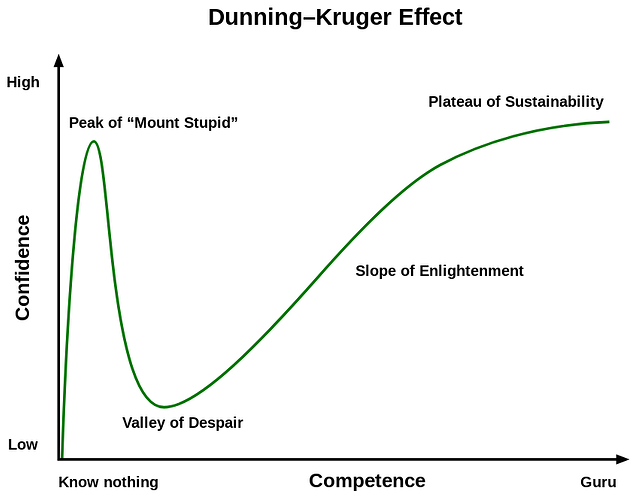Therefore you can not defend your position with rational arguments. Einstein made a famous quote, “If you can’t explain it simply, you don’t understand it well enough”.
You can not explain it simply.
You know your thesis can not withstand scrutiny. It is almost sad that this atheist has more commitment to his position than a “philosopher” (I do apologize to real philosophers).
It’s pretty funny you think you’ve participated in any meaningful way.
2 Likes
@Philosopher
Oi, Laughing boy.
I haven’t tried to dissect your post. That’s because of the way you respond to others.
Instead, I tried a little test. I pointed out a simple logical fallacy. Pretty sure I’m right, but I’m always open to correction.
I pointed out that your claim about others not understanding the concept of Karma is an hominem fallacy. IE attacking the man rather than the argument. I even posted a pretty good article which explains the nature of an argumentum ad hominem fallacy.
Then I asked you to explain what seems to be an uninformed opinion (about what others know)
Just realised I have another question; why on earth should I accept you are an expert in aspects of some eastern religions? So far you posts have shown it is you who is lacking.
I’ve been bemused by your name of ‘philosopher’ since you first started posting .Your use of language suggests some academic training, although not in logic or philosophy . Be fascinated to know if you are a scholar who has wandered away from his discipline and out of his depth. Or perhaps an autodidact who doesn’t know what he doesn’t know and is too lost to be able to learn or accept help.
I think you’re rejecting a great opportunity. The people here are actually very kind and accepting and many are very erudite. Many have degrees and decades of study in chosen fields. You could actually learn a lot here. ( I learn something her most days)
Post poorly thought out, challenging ideas, and they will be attacked. You will be attacked when you make it personal.
Respect is earned ,so far your ideas have not earned respect .However, we are not your enemy unless you insist. We don’t need to be. If you behave as obnoxiously in real life as you behave here, you are already doing a bang up job in that role. 
2 Likes
Make it easier for everyone and call a spade a spade. You’re describing the apex point (peak of “Mount Stupid”) of the Dunning-Kruger curve.
I didn’t want to be unkind. Not quite convinced the chap is of below average intellect. He does however seem to fit into the broad category of trying desperately to prove he’s more knowledgeable than is in fact the case.
…which is a person at the apex point of the Dunning-Kruger curve – someone who has great confidence in his/her knowledge base, but whose actual knowledge is nothing to brag about. “Peak of Mt. Stupid” can admittedly be a rather unkind (or even offensive) term for the condition, but has the benefit of being to-the-point and rather descriptive.
how about…
max(∀dD/dt = 0)
So they won’t know what you mean 
1 Like
Neither will I.
I am mathematically illiterate. Did pass maths once after grade 7. Led me to believe I was really stupid. Then I went to university and managed to pass an open book exam on symbolic logic. Then promptly dropped the subject because I hated it. .
I got really pissed of with James Joyce when I tried to read Uysses. He kept slipping in phrases in Greek. First time I actually resented my own ignorance . I was 18. I guess I could try again, with a computer in one hand.
Actually, I think I prefer it more along the lines of this:
Let c(k) be the Dunning-Kruger curve, with confidence c as a function of competence k.
Then overconfidence Co is given by
Co=c(k’)
where k’ is the k that satisfies
dc/dk=0 ∧ d2c/dk2<0.
Let subjectively minmally felt competence at Valley of Despair be Di
Di=c(k’‘)
where k’‘>k’ is the k that satisfies
dc/dk=0 ∧ d2c/dk2>0.
For competences k’‘’>k’‘, the Functional competence Fu is given through
Fu=c(k’‘’)
where dc/dk|k=k’‘’>0.
3 Likes
Its impossible to rule out the Dunning Kruger effect after reading @Philosopher’s post. Bias is often a derivative of over confidence, and the fact he simultaneously hurls unevidenced accusations of bias at others, without even reading what they post, speaks volumes.
Like dismissing 50% of the views expressed in their entirety without even reading them, or offering any explanation beyond a generic sweeping derogation? Coming to an atheist forum, when you don’t wish to read or understand their rationale, especially when they point out logical fallacies his own views are based on, is setting a pretty low standard. In fact it’s hard to imagine a lower standard for debate or reasoning. Especially when you consider @Philosopher’s own indisputable bias. Illustrated here for example…
No they’re not, and merely believing anything is 100% certain is as closed minded as anyone can get.
And here of course…
Dear oh dear…
A mind that closed is never ever going to recognise sound reasoning. As we have seen.
Closed mindedness is a bias against new ideas, especially when they differ to strongly held ideas and beliefs.
@Philosopher has admitted to ignoring up to 50% of views without reading them, and to be 100% certain his deity is real.
Quod erat demonstrandum.
3 Likes
A favourite clip: The Sinking Of Hy- Brasil from Erik The Viking.
There’s no essential difference between arguing a god into existence and defining a god into existence, as you have done here.
F.
If an argument contains unevidenced assumptions about the thing being argued for, then it is a begging the question fallacy. So when the definition or characteristics are offered in first cause arguments, that makes the argument irrational. At least that form of it anyway.
Unless of course, the definition is supported by objective evidence. Simply arguing such characteristics are necessary, is simply creating a circular easoning fallacy as well.
2 Likes
IMO the “first cause argument” is a fail because if you look far back enough, eventually you have to resort to special pleading.
What caused us, what caused the universe? God. What caused god? errr … umm …ummmm
2 Likes
Yes, a special pleading fallacy is an inevitable result in a first cause argument. Nor are those the only two fallacies, that are usually used in first cause arguments of course.
1 Like
But…but…it’s all a part of God’s plan!!!
I really want to post the comic strip on my desk at work. Enlarged and used as wall paper on the 5 ft. tall divider,
1 Like
Indeed. It’s also known as the teleological and cosmological argument, the watchmaker argument plus of course intelligent design and the intellectually dishonest irreducible complexity arguments.
I’m very fond of watching Richard Dawkins use his training to demolish irreducible complexity.
1 Like





